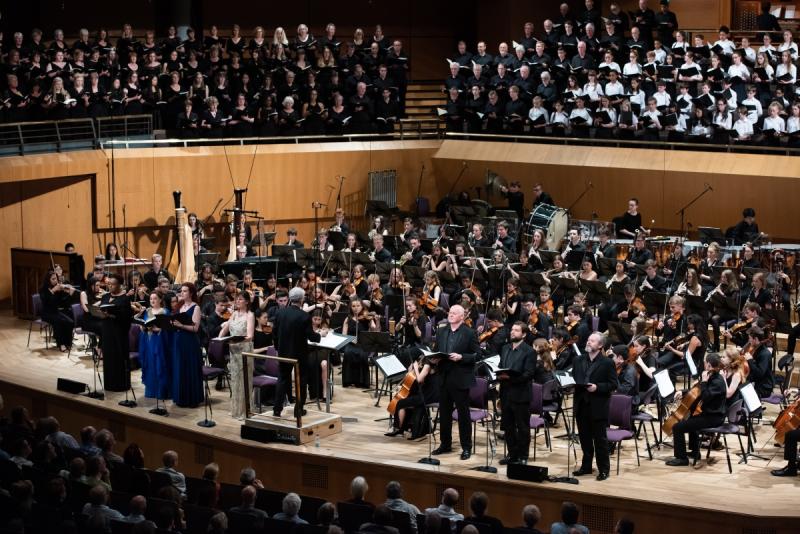Chetham's Symphony Orchestra, Chetham's Chorus, Threlfall, Bridgewater Hall, Manchester - a thrilling triumph | reviews, news & interviews
Chetham's Symphony Orchestra, Chetham's Chorus, Threlfall, Bridgewater Hall, Manchester - a thrilling triumph
Chetham's Symphony Orchestra, Chetham's Chorus, Threlfall, Bridgewater Hall, Manchester - a thrilling triumph
Truly awesome Mahler is the highspot of Chetham’s 50th anniversary year

As end-of-term concerts go, Mahler’s Eighth Symphony is a biggie. In fact it’s hard to imagine any place of secondary education where they would even contemplate it.
But for Chetham’s School of Music, the "Symphony of a Thousand" was a doable task, and for Stephen Threlfall’s last public appearance for Chetham’s as director of music it became a thrilling triumph. They’re only part of the way through celebrating 50 years of Chetham’s existence in 2019 – this was number 32 in a 50-concert series running through the year – but of those 50 it will probably be remembered the longest.
Recorded for Radio 3, with school Patron HRH The Earl of Wessex present and joining the universal standing ovation at the end, it aptly drew together both the students of today and some alumni and guest players. Around 130 made up the total muster of Chetham’s Symphony Orchestra, and with Chetham’s Chorus augmented by Leeds Festival Chorus and St George’s Singers, and Chetham’s Children’s Choir augmented by Manchester and Hereford Cathedral choristers, there were pretty near to 500 performers (which is about as big a battalion as you ever get for a Mahler 8).
Soloists – some Chetham’s alumni themselves – were sopranos Gweneth Ann Rand, Ailish Tynan and Caroline Taylor, mezzos Kitty Whately and Margaret McDonald, tenor Mark Le Brocq, baritone Gareth Brynmor John and bass Paul Carey Jones.
 As a team they would have been the envy of any promoter, and perhaps the greatest excellence of this concert lay in their being together to do it. That in itself was a tribute to Stephen Threlfall (pictured left), and he knew it, giving full rein to those whose top registers could soar above the textures – the two high sopranos and tenor in particular, high Cs and Bs flashing out like shooting stars above the surging sea of sound.
As a team they would have been the envy of any promoter, and perhaps the greatest excellence of this concert lay in their being together to do it. That in itself was a tribute to Stephen Threlfall (pictured left), and he knew it, giving full rein to those whose top registers could soar above the textures – the two high sopranos and tenor in particular, high Cs and Bs flashing out like shooting stars above the surging sea of sound.
There was opportunity, too, for Kitty Whately’s gentler qualities to bloom in her solo as one of the More Perfect Angels in Part Two, the setting of the closing scene of Goethe’s Faust, and also for Gareth Brynmor John’s as Pater Ecstaticus, along with Paul Carey Jones’s as Pater Profundus. Caroline Taylor, stationed on high in the auditorium to sing the Mater Gloriosa’s benedictions at the close, floated her tone down like gentle rain from heaven.
The most distinctive quality of the whole performance was created by Stephen Threlfall: his skills as a conductor have long been clear to all who have seen him in action over the years here, and the geniality, cheerfulness and energy of the man shone through every bar of this concert.
His speeds were always vigorous, and at the same time he’d coached his vast orchestral forces to deliver the kind of clean articulation that’s needed in the generous Bridgewater Hall acoustic. When Mahler writes a quaver followed by a semiquaver rest and then a semiquaver note, it’s not just another dotted quaver, and it didn’t sound like it either. The Chetham’s Symphony Orchestra strings might not have delivered the stratospheric acrobatics occasionally demanded of them to absolute perfection, but they could create some wonderfully warm tone, and once we were into Part Two the woodwind and brass shone brightly, the remarkable and rapid dynamic contrasts coming through with precision and impressive effect. There were excellent solos from the departmental principals, too.
The choral singers, welded into two full choirs and a children’s chorus from their disparate origins for this occasion, made a robust sound en masse, even if the occasional lead in the welter of counterpoint came over rather more gently than might have been ideal.
They began with wondrously warm sotto voce tone in Britten’s setting of "God Save the Queen", which was actually the first item on the programme – after the heroics of Mahler its calm assurance and unalloyed joys became a distant memory, but it was a remarkable thing in itself. Threlfall had everyone completely on his side, and if beginnings and endings are the key to the impact of a performance, this one was truly awesome.
rating
Explore topics
Share this article
The future of Arts Journalism
You can stop theartsdesk.com closing!
We urgently need financing to survive. Our fundraising drive has thus far raised £49,000 but we need to reach £100,000 or we will be forced to close. Please contribute here: https://gofund.me/c3f6033d
And if you can forward this information to anyone who might assist, we’d be grateful.

Subscribe to theartsdesk.com
Thank you for continuing to read our work on theartsdesk.com. For unlimited access to every article in its entirety, including our archive of more than 15,000 pieces, we're asking for £5 per month or £40 per year. We feel it's a very good deal, and hope you do too.
To take a subscription now simply click here.
And if you're looking for that extra gift for a friend or family member, why not treat them to a theartsdesk.com gift subscription?
more Classical music
 Bizet in 150th anniversary year: rich and rare French offerings from Palazzetto Bru Zane
Specialists in French romantic music unveil a treasure trove both live and on disc
Bizet in 150th anniversary year: rich and rare French offerings from Palazzetto Bru Zane
Specialists in French romantic music unveil a treasure trove both live and on disc
 Scottish Chamber Orchestra, Ibragimova, Queen’s Hall, Edinburgh review - rarities, novelties and drumrolls
A pity the SCO didn't pick a better showcase for a shining guest artist
Scottish Chamber Orchestra, Ibragimova, Queen’s Hall, Edinburgh review - rarities, novelties and drumrolls
A pity the SCO didn't pick a better showcase for a shining guest artist
 Kilsby, Parkes, Sinfonia of London, Wilson, Barbican review - string things zing and sing in expert hands
British masterpieces for strings plus other-worldly tenor and horn - and a muscular rarity
Kilsby, Parkes, Sinfonia of London, Wilson, Barbican review - string things zing and sing in expert hands
British masterpieces for strings plus other-worldly tenor and horn - and a muscular rarity
 From Historical to Hip-Hop, Classically Black Music Festival, Kings Place review - a cluster of impressive stars for the future
From quasi-Mozartian elegance to the gritty humour of a kitchen inspection
From Historical to Hip-Hop, Classically Black Music Festival, Kings Place review - a cluster of impressive stars for the future
From quasi-Mozartian elegance to the gritty humour of a kitchen inspection
 Shibe, LSO, Adès, Barbican review - gaudy and glorious new music alongside serene Sibelius
Adès’s passion makes persuasive case for the music he loves, both new and old
Shibe, LSO, Adès, Barbican review - gaudy and glorious new music alongside serene Sibelius
Adès’s passion makes persuasive case for the music he loves, both new and old
 Anja Mittermüller, Richard Fu, Wigmore Hall review - a glorious hall debut
The Austrian mezzo shines - at the age of 22
Anja Mittermüller, Richard Fu, Wigmore Hall review - a glorious hall debut
The Austrian mezzo shines - at the age of 22
 First Person: clarinettist Oliver Pashley on the new horizons of The Hermes Experiment's latest album
Compositions by members of this unusual quartet feature for the first time
First Person: clarinettist Oliver Pashley on the new horizons of The Hermes Experiment's latest album
Compositions by members of this unusual quartet feature for the first time
 Gesualdo Passione, Les Arts Florissants, Amala Dior Company, Barbican review - inspired collaboration excavates the music's humanity
At times it was like watching an anarchic religious procession
Gesualdo Passione, Les Arts Florissants, Amala Dior Company, Barbican review - inspired collaboration excavates the music's humanity
At times it was like watching an anarchic religious procession
 Classical CDs: Camels, concrete and cabaret
An influential American composer's 90th birthday box, plus British piano concertos and a father-and-son duo
Classical CDs: Camels, concrete and cabaret
An influential American composer's 90th birthday box, plus British piano concertos and a father-and-son duo
 Cockerham, Manchester Camerata, Sheen, Martin Harris Centre, Manchester review - re-enacting the dawn of modernism
Two UK premieres added to three miniatures from a seminal event of January 1914
Cockerham, Manchester Camerata, Sheen, Martin Harris Centre, Manchester review - re-enacting the dawn of modernism
Two UK premieres added to three miniatures from a seminal event of January 1914
 Kempf, Brno Philharmonic, Davies, Bridgewater Hall, Manchester review - European tradition meets American jazz
Bouncing Czechs enjoy their Gershwin and Brubeck alongside Janáček and Dvořák
Kempf, Brno Philharmonic, Davies, Bridgewater Hall, Manchester review - European tradition meets American jazz
Bouncing Czechs enjoy their Gershwin and Brubeck alongside Janáček and Dvořák
 Solomon, OAE, Butt, QEH review - daft Biblical whitewashing with great choruses
Even a top soprano and mezzo can’t make this Handel paean wholly convincing
Solomon, OAE, Butt, QEH review - daft Biblical whitewashing with great choruses
Even a top soprano and mezzo can’t make this Handel paean wholly convincing

Add comment